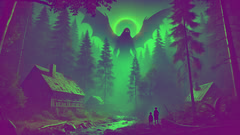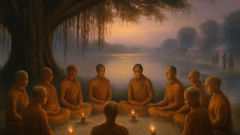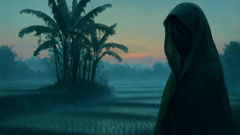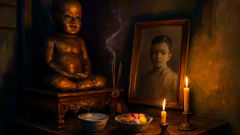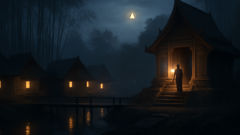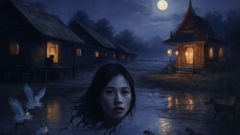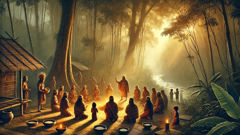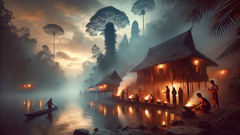Introduction
In the heart of medieval Hungary, where ancient forests sprawled across rolling hills and rivers glinted beneath the gaze of the distant Carpathians, stories were more than just entertainment—they were the lifeblood of the villages. Among the most fearsome and persistent of these stories was the legend of the Markolab, a creature whispered about in the hush of twilight, its name uttered only when the firelight flickered and the shadows seemed to stretch their fingers across mud-brick walls. The Markolab, villagers believed, was no mere beast. It was a monstrous entity that soared beyond the reach of mortal men, a devourer of the celestial bodies that watched over the land. When the sun was suddenly swallowed in the middle of the day or the full moon vanished from a clear sky, people did not think of science or the slow dance of planets. They thought of the Markolab, jaws wide and eyes burning with ancient hunger, feasting on light itself. Every eclipse was a reminder: the world’s fate hung by a slender thread, and the Markolab’s appetite was insatiable. In the village of Csermely, nestled at the forest’s edge, this fear was as real as hunger or cold. Here, stories of the Markolab shaped the rhythm of daily life. Children grew up learning to bang pots and shout spells during eclipses, hoping their noise would frighten the beast away. Elders wove tales by the hearth, passing down the old wisdom: courage was the only shield against darkness, and unity was its only match. But legends, like shadows, can sometimes take on new shapes. On a summer’s eve, as dusk slipped into night and a rare celestial event was whispered on the wind, two unlikely heroes—a stargazer with eyes full of wonder and a village girl with an indomitable spirit—would find themselves swept up in a tale as old as the moon, where myth and truth collide, and where the fate of Hungary’s sky would rest on their courage.
The Shadow Over Csermely
The first sign was the birds. They fell silent long before the rest of the world noticed anything amiss. In Csermely, where morning always began with a riot of thrushes and larks, the hush was unsettling. György, a youth with a wild mop of hair and a mind bent always toward the sky, noticed it before most. He sat atop the roof of his family’s cottage with a battered astrolabe in his hands, squinting at the rising sun. Beside him, his younger sister Lilla scrambled up, her face smudged with flour from the morning’s baking. "Why’s it so quiet?" she whispered. György didn’t answer at first. He frowned at the horizon, where a strange darkness seemed to grow, eating away at the blue. The sun’s edge blurred, as if something vast and hungry was creeping across its surface. In the square below, mothers called their children inside. Old János, the village storyteller, limped from door to door, banging a wooden spoon against a pot. "Inside! Quick, now! The Markolab wakes!" he shouted. The name was enough to send shivers through every heart. György felt the weight of it, but something inside him rebelled against fear. He had spent countless nights mapping the stars, charting their rhythms. He knew the heavens moved with purpose, not malice. Yet the stories of the Markolab haunted him, too—could there be something more, something older than wisdom or science? Lilla tugged at his sleeve. "Let’s go, György. Mama’s calling." But György shook his head. "I want to see. Just for a moment." He slid down the thatch, landing lightly on his feet. Lilla followed, her curiosity stronger than her fear. Together, they crept to the edge of the forest, where the world felt ancient and strange. The darkness deepened, swallowing color and sound. The air grew cold. In the clearing beyond, shadows writhed and twisted as if alive. Then, above the treetops, something moved—a shape vast and sinuous, outlined by a faint, sickly glow. György’s breath caught. The Markolab. Its body was a patchwork of scales and fur, its wings like shrouds of midnight mist. Eyes—too many to count—burned with cold fire. Its jaws opened wide, and the sun disappeared in a single gulp. For a moment, the world was plunged into silence so complete it felt suffocating. Then the village erupted in noise. Pots clanged, voices rose in a desperate chorus. Spells and prayers tumbled from trembling lips. In the chaos, György and Lilla stood transfixed, the only witnesses to the Markolab’s majesty and terror. But as the creature turned its gaze toward them, György did not run. Instead, he stared back, a flicker of defiance kindling in his heart.
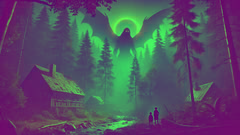
Through the Valley of Shadows
The next day dawned gray and uncertain. Though the eclipse had passed and the sun had returned, its light seemed weaker, paler, as if some vital part had truly been consumed. The village was restless, filled with whispers and fear. People hung garlic and painted protective symbols on their doors. The elders convened in the square, debating rituals to appease the Markolab. György, however, couldn’t sit still. He poured over his father’s old charts and pored through János’s stories, hunting for any clue that might explain what he had seen. Lilla watched him from across the table, her flour-dusted hands now drawing nervous circles in the dust. At noon, a sudden commotion drew them outside. A stranger had arrived—an old woman cloaked in a patchwork mantle, her hair silver and wild. She called herself Erzsébet and claimed to know the secrets of the Markolab. "The beast comes when people forget the old ways," she said, her voice like wind through dry leaves. "It feeds on discord and fear as much as it feeds on the sun and moon. If you wish to save your sky, you must journey into the heart of its lair." The villagers hesitated, but György stepped forward. "Tell us what to do." Erzsébet smiled, a sad, knowing curve of her lips. "It must be someone who has looked into the Markolab’s eyes and not turned away." Lilla’s hand shot up. "We both saw it! We’ll go!" The old woman nodded. She gave them a pouch of dried herbs, a bone whistle, and a riddle: "When shadow swallows light, seek the oldest tree—there the truth is hidden." As dusk fell, György and Lilla slipped away from the village, following Erzsébet’s cryptic words. The forest was alive with ancient energy. Roots curled like sleeping serpents, and every hollow seemed to breathe. Lilla clutched György’s arm as they pressed deeper, past places even hunters dared not tread. Hours passed in uneasy silence until they found it: a tree older than memory, its trunk split by lightning, its roots tangled with bones and offerings. György knelt, pressing his palm to the bark. The ground shuddered, and a secret door yawned open at the tree’s base. Torchlight flickered along a spiraling tunnel. They descended into darkness, hearts pounding. The air grew thick and cold. Shadows writhed along the walls, forming faces and claws. At the tunnel’s end, a vast cavern opened, filled with swirling mist. In the center, curled atop a mound of shattered celestial stones, lay the Markolab—larger now, as if it had grown with each swallowed star. Its eyes glimmered with pain and longing. György raised Erzsébet’s bone whistle and blew. The sound was thin but piercing, echoing through the cavern. The Markolab stirred, uncoiling with dreadful grace. It spoke—not with words but with a voice that echoed in their minds. "Why do you come, little lights?" György swallowed his fear. "To bring back what you’ve stolen. To save our world from darkness." The beast’s laughter was like distant thunder. "I take only what is given in fear. Prove your courage, and I shall return what I have claimed."
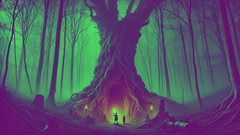
Conclusion
In the cavern’s eerie half-light, György and Lilla joined hands and stepped forward, refusing to flinch under the Markolab’s gaze. Instead of shrinking away, they spoke words of hope—recounting stories of unity, light, and bravery. As their voices grew stronger, the darkness recoiled. With each memory of kindness and courage they shared, a shimmer of golden light crept across the cavern floor. The Markolab hesitated, confused by their defiance. It had fed for centuries on fear and superstition but found itself powerless against these living sparks of hope. At last, the beast reared back and released a deep, shuddering sigh—a wind that swept through the stone chamber and carried away the mists. Aboveground, the eclipse broke. Sunlight flooded the valley, stronger than before. The villagers, hearing the jubilant cries, rushed to the forest’s edge and saw György and Lilla emerge—safe, triumphant, and forever changed. Erzsébet smiled as the children returned, her eyes twinkling with ancient understanding. The legend of the Markolab was forever altered: it became not only a warning of darkness but a celebration of those who face it with unwavering courage and unity. And so, whenever an eclipse cast its shadow across Hungary’s hills, people gathered not in fear, but together—singing, laughing, and banging pots—not to frighten away the beast, but to remember that darkness is always followed by light, and even the oldest monsters can be tamed by hope.

